Albert Pike
Statue in Washington D.C.
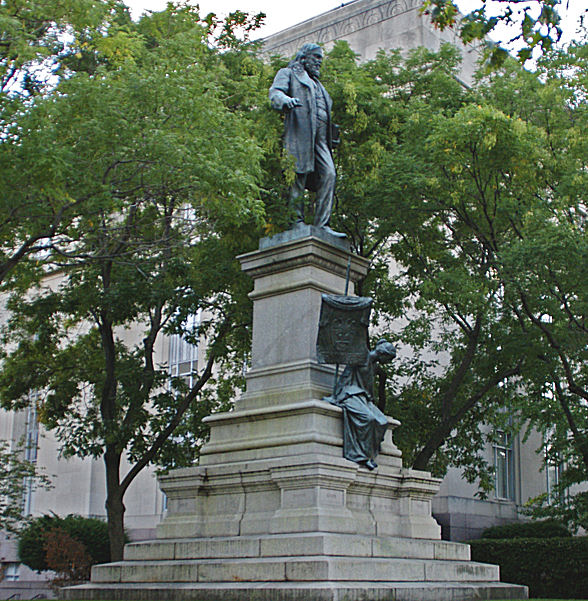
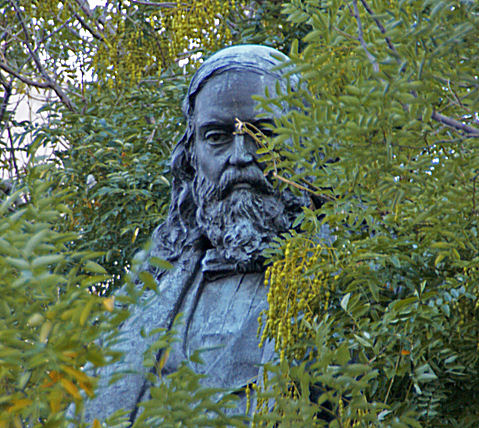
Albert Pike
Statue
Albert Pike was the head of the Scottish
Rite, Southern Jurisdiction of the Masonic fraternity, and a leading Southern
Democrat. His life-size statue has been accorded a prominent place at our
Nation's Capital among the distinguished citizens of America.
On April 9, 1898, a joint resolution of Congress was enacted to set aside
a site for the statue. This act was due, in large part, to the efforts of
two prominent Scottish Rite members, Congressman James D. Richardson, 33°,
from Tennessee and Senator Henry M. Teller, 33°, from Colorado. A nine
member committee met with the Superintendant of Public Works in
Washington, D.C., and the committee of the Library of the Senate and House
of Representatives and selected a site at the intersection of Third and D
Streets, N.W.
Albert Pike the man
(1809 - 1891)
Pike was born in
Boston, Massachusetts, son of Ben and Sarah (Andrews) Pike, and spent his
childhood in Byfield and Newburyport, Massachusetts. His colonial ancestors
included John Pike (1613-1688/1689), the founder of Woodbridge, New Jersey.
He attended school in Newburyport and Framingham until he was fifteen. In
August 1825, he passed his entrance exams and was accepted at Harvard
University though, when the college requested payment of tuition fees for
the first two years, he chose not to attend. He began a program of
self-education, later becoming a schoolteacher in Gloucester, North Bedford,
Fairhaven and Newburyport.
In 1831 Pike left Massachusetts to travel west, first stopping in St. Louis
and later moving on to Independence, Missouri. In Independence, he joined an
expedition to Taos, New Mexico, hunting and trading. During the excursion
his horse broke and ran, forcing Pike to walk the remaining 500 miles to
Taos. After this he joined a trapping expedition to the Llano Estacado in
New Mexico and Texas. Trapping was minimal, and after traveling about 1300
miles (650 on foot), he finally arrived at Fort Smith, Arkansas.
Settling in Arkansas in 1833, he taught school and wrote a series of
articles for the Little Rock Arkansas Advocate under the pen name of "Casca."
The articles were popular enough that he was asked to join the staff of the
newspaper. Later, after marrying Mary Ann Hamilton, he purchased part of the
newspaper with the dowry. By 1835 he was the Advocate's sole owner. Under
Pike's administration the Advocate promoted the viewpoint of the Whig party
in a politically volatile and divided Arkansas.
He then began to study law, and was admitted to the bar in 1837, selling the
Advocate the same year. He was the first reporter for the Arkansas supreme
court, and also wrote a book (published anonymously), titled The Arkansas
Form Book, which was a guidebook for lawyers. Additionally, Pike wrote on
several legal subjects, and continued producing poetry, a hobby he had begun
in his youth in Massachusetts. His poems were highly regarded in his day,
but are now mostly forgotten. Several volumes of his works were
self-published posthumously by his daughter. In 1859 he received an honorary
Ph.D. from Harvard, but declined it.
Albert Pike was impoverished by the Civil War and remained so much of his
remaining life, often borrowing money for basic living expenses from the
Supreme Council before the council voted him an annuity in 1879 of $1,200 a
year for the remainder of his life.
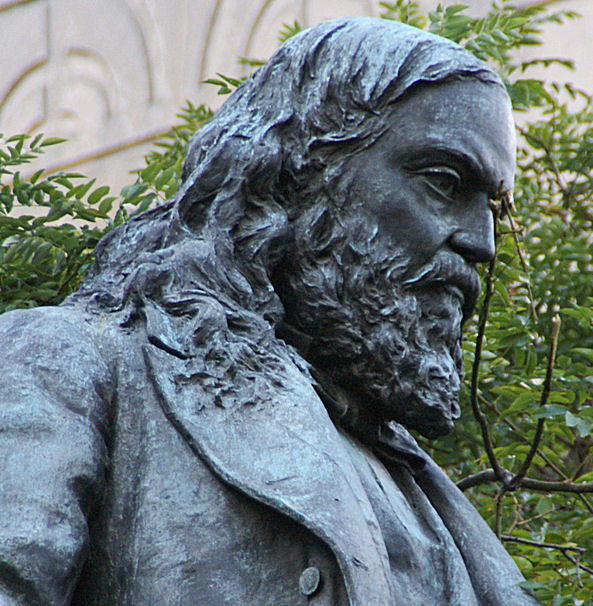
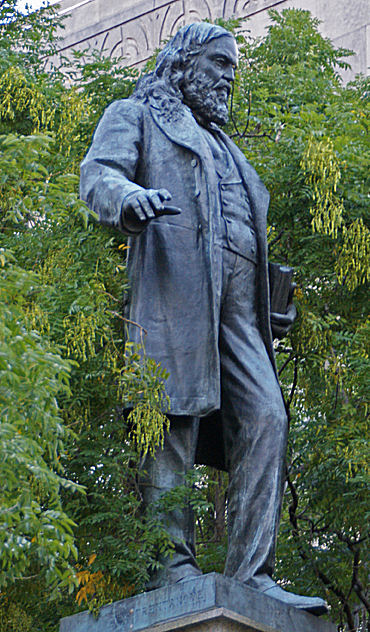
In his
left hand he holds a book,“Morals and Dogma."
"I cannot conceive of anything that could have induced Ashmole, Mainwaring, and
other men of their class to unite themselves with a lodge of working Masons,
except this - that as the Alchemists, Hermeticists, and Rosicrucians had no
association of [their] own in England or Scotland, they joined the Masonic
lodges in order to meet one another without being suspected, and I am convinced
that it was the men who inherited their doctrine who brought their symbols into
Masonry, but kept the Hermetic meanings to themselves. To these men we owe, I
believe, the Master's degree. The substitute word means "the Creative Energy
from the Father" - the Demiourgos and Hiram, I think, was made the hero, because
his name resembled Hermes, "The Master of the Lodge"; the Divine Word (the
Egyptian Thoth), the Mercury of the Alchemists." - Albert Pike
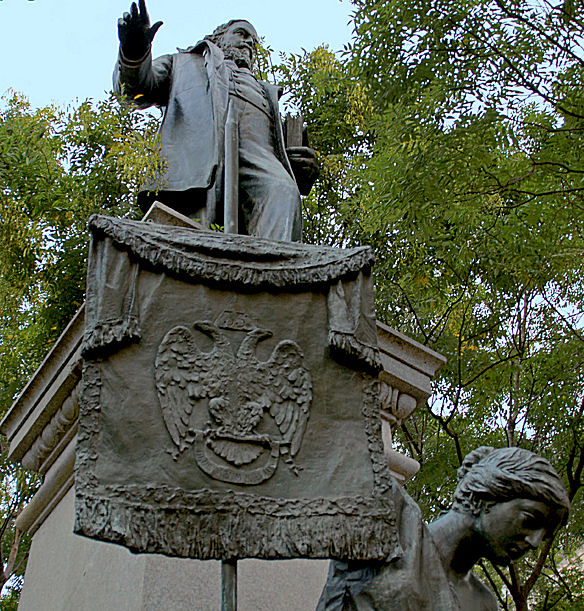
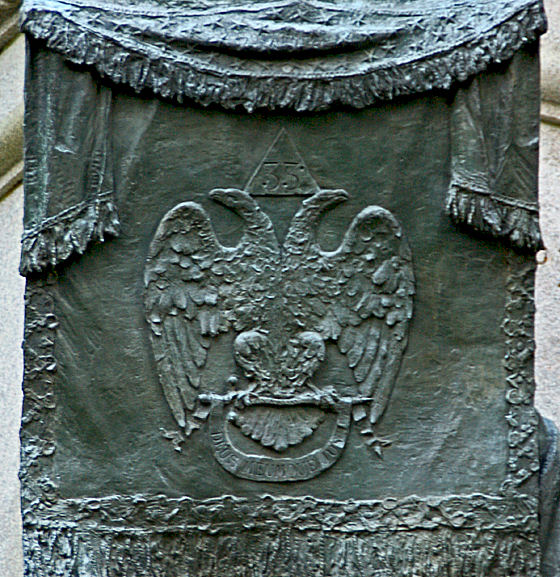
America's Plato
Albert Pike was
considered by his peers during his time to a reincarnation of Plato, the
Homer of America, and the Zoroaster of Asia.
"The True Word of a Mason is to be found in the concealed and profound
meaning of the Ineffable Name of Deity, communicated by God to Moses; and
which meaning was lost by the very precautions taken to conceal it."
Alhim 'elim (Hebrew) [plural of 'el god] One method of transliterating 'elim,
although the insertion of the h is incorrect. The number-values of the
letters of 'Elohim, transliterated as alhim are 13514: when used
anagrammatically they may be read as 31415, the value of pi.
Elohim (n.) One of the principal names by which God is designated in the
Hebrew Scriptures.
Observant Jews write down but do not pronounce the Tetragrammaton, because
it is considered too sacred to be used for common activities. Even ordinary
prayer is considered too common for this use. The Tetragrammaton was
pronounced by the High Priest on Yom Kippur when the Temple was standing in
Jerusalem. Since the destruction of the Temple in 70 CE, the Tetragrammaton
is no longer pronounced, and while Jewish tradition holds that the correct
pronunciation is known to a select few people in each generation, it is not
generally known what this pronunciation is. Instead, common Jewish use has
been to substitute the name "Adonai" ("My Lord") where the Tetragrammaton
appears.
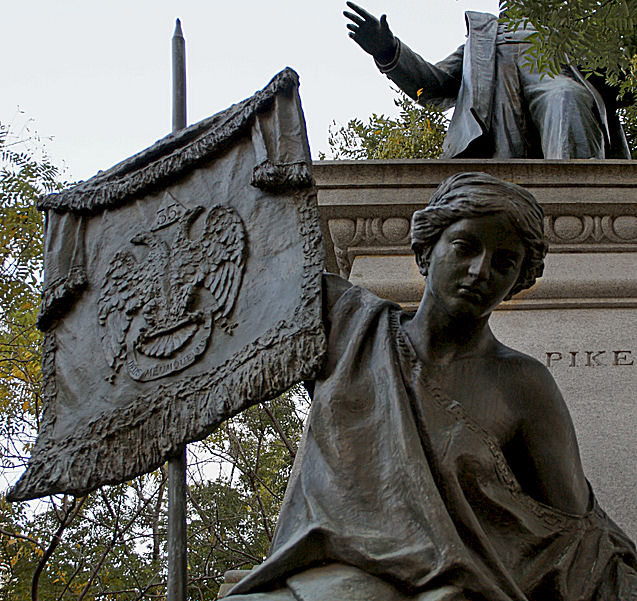
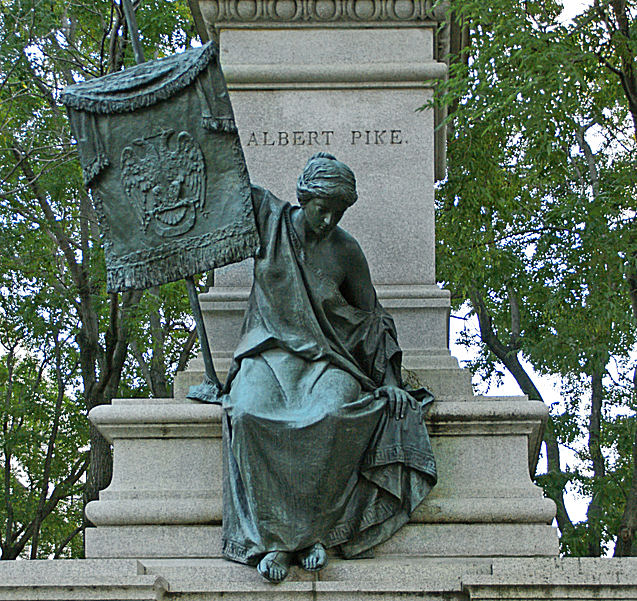
Double-Headed Eagle
of Lagash
"As the
Adept knows, the double-headed eagle is a Hermetic Symbol, representing the
Divine Generative Potency, and Productive Capacity of Nature. like the human
figure with two heads, one male the other female, - God and Nature; the
Egypian Osiris and Isis."
Long used as the insigne of a Scottish Rite Mason, the "Double Headed Eagle
of Lagash" is now the accepted emblem in the United States of America of the
32 Degree. It is the oldest crest in the world. It was a symbol of power
more than two thousand years before the building of King Solomon's Temple.
No other heraldic bearing, no other emblematic device of today can boast
such antiquity.
Triangle of Perfection (Wisdom, Power, and Beauty) - made to represent the
Tetragrammaton, or sacred name of God. Yahweh is the Hebrew vocalization of
the Tetragrammaton יהוה.
The two headed eagles are the coming together of two houses (families),
Abraham and Lot though Boaz and Ruth.
The Supreme Council awards the 33° as a way of honoring outstanding and
selfless work performed in the Rite or in public life. At its annual session
the Supreme Council elects members of the Rite to receive the degree.
Members unanimously so elected become Honorary Members of the Supreme
Council.
"On the 1st of May, 5786, The Grand Constitution of the Thirty-third Degree,
called the Supreme Council of Sovereign Grand Inspectors General, was
finally ratified by His Majesty King of Prussia, who as Grand Commander of
the order of Prince of the Royal Secret, possesed Sovereign Masonic power
over all the Craft." - Origin and Progress of the Supreme Council 33rd
Degree of the Ancient and Accepted Scottish Rite for England, Wales, the
Dominions and Dependencies of the British Crown.
Gandaberunda (Gun-daa-bhae-rundaa, from Kannada) is an Indian mythological
bird. It is always shown with two heads and beaks, and believed to possess
magnificent strength. Ancient religious Hindu texts (Vishnu Puranas)
annotate the Gandaberunda to be a personification of Lord Vishnu, the
Mediator (one of the three primary Gods in Hinduism).
The double-headed eagle first originated in the mighty Sumerian city of
Lagash. From cylinders taken from the ruins of this ancient city, the
double-headed eagle seems to have been known to the kings of the time as the
Storm Bird. From the Sumerians this symbol passed to the men of Akkad, from
whom it was brought to the Emperors of the East and West by the Crusades.
Eagle, with a natural head, was an emblem of Jupiter, that is, god of moral.
To the pagans, Eagle, with a natural head, was an emblem of Jupiter, that
is, god of moral law and order, protector of suppliants and punisher of
guilt. Among the Druids, Eagle was a symbol of their Supreme Being.
The double-headed eagle was adopted by emperor Isaakios Komnenos (1057-1059)
being influenced from local traditions about such a beast (the haga) in his
native Paphlagonia in Asia Minor. Local legends talked about this giant
eagle with two heads that could easily hold a bull in its claws; the haga
was seen as a representation of power, and people would often "call" it for
protection.
There seem to be some who believe that the double-headed eagle may have been
a Masonic symbol as early as the twelfth century, but, it probably was first
known to Freemasonry in 1758, upon the establishment of the Council of
Emperors of the East and West in Paris. This was a part of the Rite of
Perfection, a rite of twenty-five degrees, from which was evolved a large
part of the present system of Scottish Rite.
The successors today of the council of Emperors of the East and West, are
the various Supreme Councils of the Thirty-third Degree throughout the
world. They have inherited the insignia of the personal emblem of Frederick
the Great, First Sovereign Grand commander, who conferred upon the rite the
right to use in 1786; at which time seven additional Degrees were "Adopted"
making thirty-two "Ancient" and "Accepted" Degrees to which was added a
governing Degree, the 33rd.
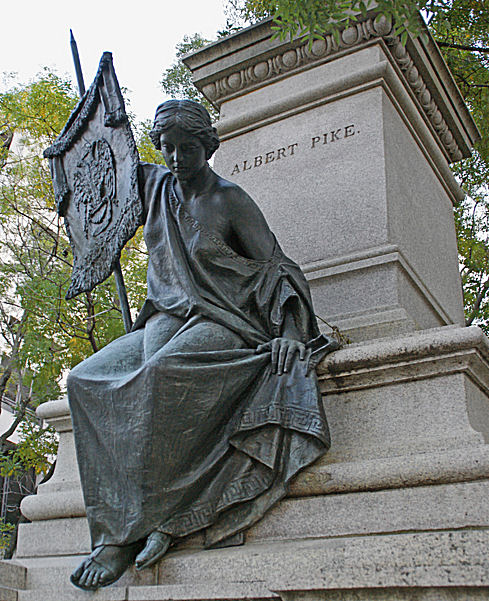
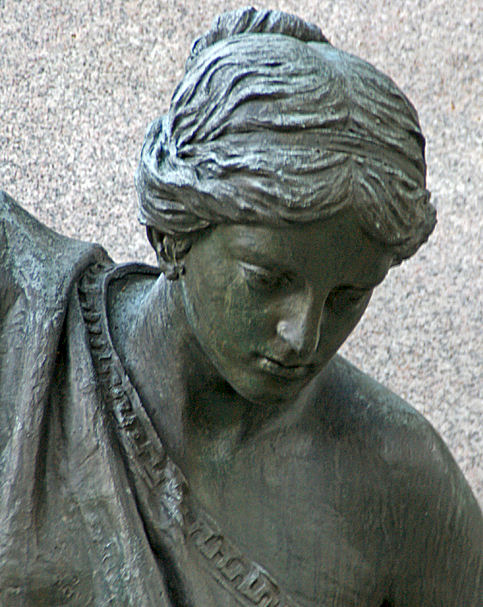
The Goddess of Masonry
Love Athena only; the
Divine
The Mithraic Mysteries
Minerva, was the Roman
name for Athena
The Mysteries of Isis
The symbolism of Isis is
celebrated as the ideal mother and wife, patron of nature and magic.
The idea of the Christian Hierophants (interpreters of the holy word of God)
was to create a society devoted to abnegation (rejection of a belief) by
solemn vows, protected by severe regulations; which should be recruited by
initiation, and which, sole depositary of the great religious and social
secrets, should make Kings and Pontiffs, without exposing it to the
corruptions of Power.
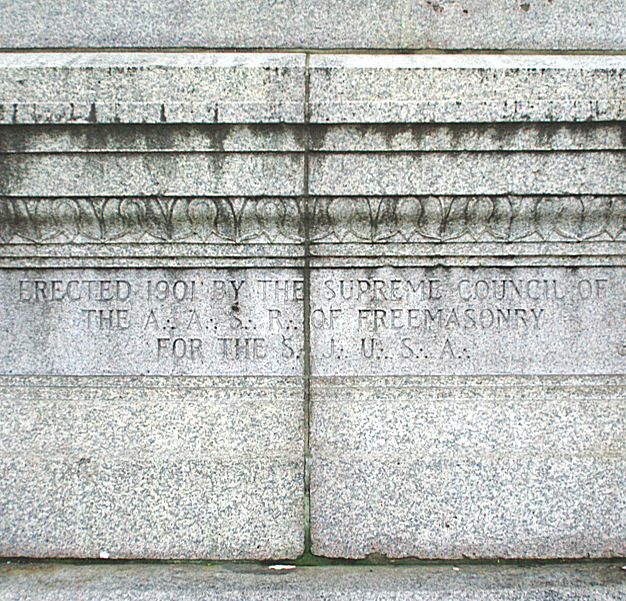
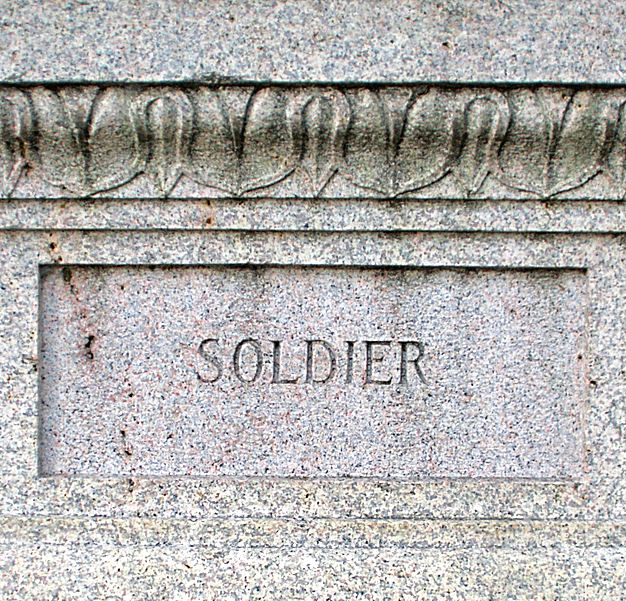
Brigadier General
Albert Pike
"Masonry will do all in
its power, by direct exertion and cooperation, to improve and inform as well
as to protect the people; to better their physical condition, relieve their
miseries, supply their wants, and minister their necessities. Let every
Mason in this good work do all may be in his power."
"Man advances only by degrees. The removal of one pressing calmity gives
courage to attempt the removal of the remaining evils, rendering men more
sensitive to them, or perhaps sensitive for the first time. Serfs that
writhe under the whip are disquited about their political rights; manumitted
from personal slavery, they become sensitive to political oppression.
Liberated from arbitrary power, and governed by the law alone, the begin to
scrutinize the law itself, and desire to be governed, not only by law, but
by what they deem the best law. And when the civil or temporal despotism has
been set aside, and the municipal law has been molded on the principles of
an enlightened jurisprudence, they may wake to the discovery that they are
living under some priestly or ecclesiastical despotism, and become desirous
of working a reformation there also."
In 1861 Albert Pike successfully counseled on behalf of the Choctaw Nation
to the Supreme Court of the United
States.
Just before the Civil War, Pike wrote a letter to the Northern States.
"I believe I can think dispassionately upon the question of slavery as I
needed for household servants.... I am not one of those who believe slavery
a blessing. I know it is an evil, as great cities are an evil; as the
concentration of capital in a few hands, oppressing labor, is an evil; as
the utter annihilation of free will and individuality in the army and navy
is an evil; as in this world everything is mixed with evil and good. Such is
the rule of God's providence, and the mode which he has chosen to arrange
the affairs of the world.
The Negro race is advancing towards freedom, and climbing upward in the
scale of humanity, as England's villeins and the peasantry of France did, as
the Gypsy and Russian serf are doing, and the lower classes of Hindostan;
but by a slower and more gradual process. Sit is that God brings about all
great and beneficial results.
The ascent from brutality and barbarism to civilization, from servitude to
freedom, is slow and painful. It is hardly perceptible in the compass of a
single generation. Nature works slowly, to produce...The Negro will be free
in God's good time; and the coming of that time we cannot hasten."
In 1861, Acting Confederate Secretary of State, Robert Tombs, suggested to
Confederate President Jefferson Davis, that Albert Pike be appointed as
Commissioner of Native American tribes. It is important to note that the
Provisional Confederate Congress thought friendship with the Native American
tribes was of tremendous of importance. It may be concluded that the
secessionist tribes were fed up with the United States indifference to
political equality.
"In pursuance of a resolution passed by Congress the 5th Day of March, 1861,
I appointed Albert Pike, a citizen of Arkansas, Comissioner of this
Government to all the Indian Tribes west of Arkansas and south of Kansas." -
President Jefferson Davis.
Albert Pike was given plenary power to oversee treaties with slave holding
tribes; Cherokee, Comanche, Osage, Quapaw, Senecas, and Shawnee nations.
"I have been appointed by the President of the Confederate States, a
Commissioner to your Nation, and all other Nations and Tribes west of
Arkansas; that I shall at the proper time come among you to counsel with
you, and that I shall take your interests in charge, see that your title to
your lands, and all annuities, and other moneys due to you by the United
States are assumed and guaranteed by the Confederate States. On this you may
implicitly rely; as it is the promise of one who never breaks his word." -
Albert Pike letter to the Choctaw Nation, June 1861.
Like most other Rebel officers, Albert Pike was indicted for treason by the
United States, but was subsequently restored to his civil rights.
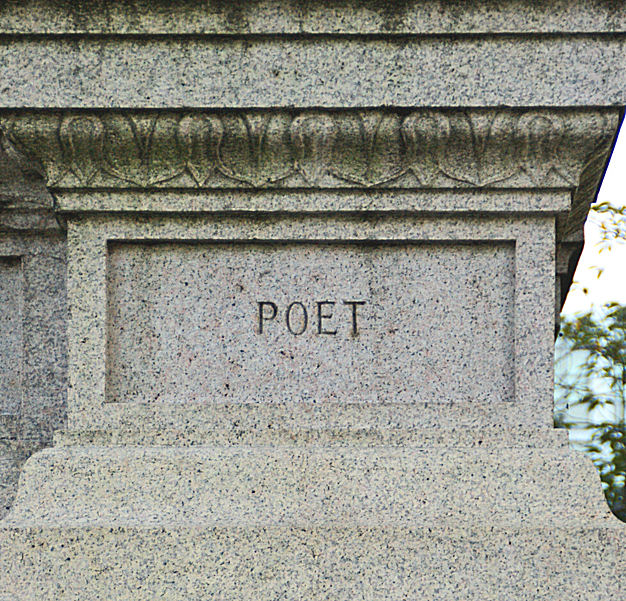
Albert Pike - POET
The renowned Edgar
Allan Poe praised him as America's greatest classic poet, and Pike's poetry
was printed in every major literary magazine of the day.
Here is a Confederate war song, "Dixie," written by Albert Pike:
Southrons, hear your Country call you!
Up! lest worse than death befall you!
To arms! To arms! To arms! in Dixie!
Lo! all the beacon-fires are lighted,
Let all hearts to now united!
To arms! To arms! To arms! in Dixie!
Advance the flag of Dixie!
Hurrah! hurrah!
For Dixie's land we take our stand,
And live or die for Dixie!
To arms! To arms!
And conquer peace for Dixie!
To arms! To arms!
And conquer peace for Dixie!
Hear the Northern thunders mutter!
Northern flags in South wind flutter;
[To arms, etc.
Send them back your fierce defience!
Stamp upon the accursed alliance!
To arms, etc.
Advance the flag of Dixie! etc.
Fear no danger! Shun no labor!
Lift up rifle, pike, and sabre!
to arms, etc.
Should pressing close to shoulder,
Let the odds make each heart bolder!
To arms, etc.
Advance the flag of Dixie! etc.
How the South's great heart rejoices,
At your cannons' ringing voices;
To arms! etc.
For faith betrayed and pledges broken,
Wrongs inflicted, insults spoken;
To arms! etc.
Advance the flag of Dixie! etc.
Strong as lions, swift as eagles,
Back to their kennels hunt these beagles;
To arms! etc.
Advance the flag of Dixie! etc.
Swear upon your Country's altar,
Never to submit or falter;
To arms! etc.
Till the spoilers are defeated,
Till the Lord's work is completed.
To arms! etc.
Advance the flag of Dixie! etc.
Halt not, till our Federation
Secures among Earth's Powers its station!
To arms! etc.
Then at peace, and crowned with glory,
Hear your children tell the story!
To Arms! etc.
Advance the flag of Dixie! etc.
If the loved ones weep in sadness,
Victory soon shall bring them gladness:
To arms! etc.
Exultant pride soon banish sorrow;
Smiles chase tears away to-morrow.
To arms! etc.
Advance the flag of Dixie! etc.
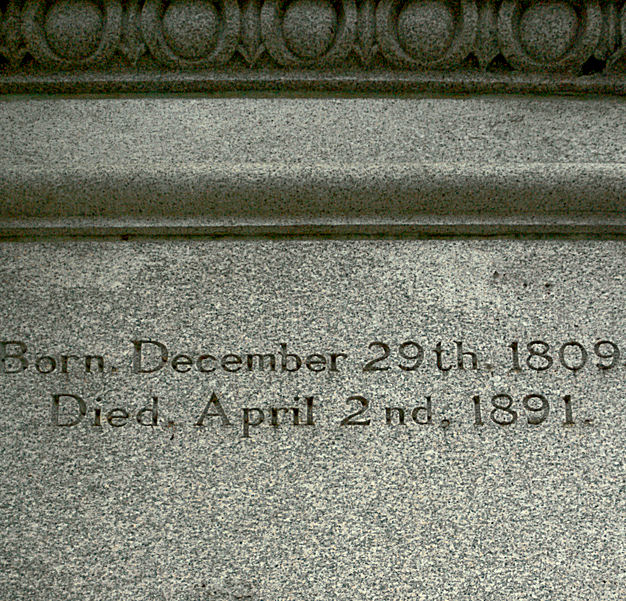

|
